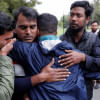Right-wing terror threat on the rise
Generally considered peaceful and safe, New Zealand on Friday witnessed a gruesome massacre reminiscent of the one carried out by Norwegian Anders Breivik who had killed 77 people in 2011.
The possibility of such terrorist attacks happening again could not be ignored completely due to the global threat of rising violent extremism.
The Institute for Economics and Peace of Australia had indicated that such activities were on the rise.
Terrorists on Friday shot dead 49 people and wounded about 40 others in two mosques in Christchurch. The details of the massacre are still emerging.
The Sydney-based think tank in its Global Terrorism Index 2018 said the “threat of far-right political terrorism was on the rise”. It cited statistics showing a significant increase in the number of attacks and fatalities over the preceding years.
“There were 66 deaths from terrorism caused by far-right groups and individuals from 113 attacks for the years from 2013 to 2017,” the report said.
Of those, 17 deaths and 59 attacks occurred in 2017 alone. In Western Europe, there were 12 attacks in the UK, six in Sweden, and two each in Greece and France. In the US, there were 30 attacks in 2017 which resulted in 16 deaths.
The majority of the attacks were carried out by lone actors with “far-right, white nationalist or anti-Muslim beliefs”.
Anti-Defamation League, a New York-based organisation which monitors antisemitism and other hate crimes, found that every terrorist murder in the USA last year was linked to far-right extremism. At least 50 people were killed by an attacker connected to right-wing extremism last year, an increase of 35 percent from the previous year.
It also reported that 71 percent of the extremist-related fatalities in the USA between 2008 and 2017 were committed by members of the far-right or white-supremacist movements. Islamist extremists were responsible for just 26 percent.
Data compiled by Global Terrorism Database, that has tabulated terrorist events around the world since 1970, showed that almost two-thirds of terror attacks in the US in 2017 were tied to racist, anti-Muslim, homophobic, anti-Semitic, fascist, anti-government, or xenophobic motivations.
Prof Imtiaz Ahmed of Dhaka University said many global leaders, including Donald Trump, in their speeches criticised minority community people which encouraged the far-right terrorism.
“The far-right terrorism did not get much focus like the way the religious terrorism got. This is the high time to give more focus on it as it is on the rise.”
The teacher of international relations said nobody was talking about control of arms used by common people.
“A global pressure should be created on those countries where people have easy access to arms. If we look at the far-right terrorism incidents, we will see that most of those were carried out by using arms,” he added.
Although the majority of deaths from terrorism in North America since the turn of the century have been related to Jihadist groups, there has been a resurgence of far-right political terrorism in the past few years, according to Global Terrorism Index 2018.
“In 2017, white power extremists were responsible for nine attacks and seven deaths in North America,” it said.
The report said the most notable terror attack committed by white extremists in 2017 occurred in August during the “Unite the Right” rally in Charlottesville, North Virginia, when a white extremist drove a car into a crowd and killed one person.
In October last year, a white power extremist shot dead 11 people at a Pittsburgh synagogue.
Canada experienced six terror-related deaths in 2017, all of which were the result of an armed assault at the Islamic Cultural Centre of Quebec City by a right-wing extremist.
Some recent events have heightened the fear of future far-right terrorism. On October 27 last year, anti-Semitic gunman Robert Bowers killed 11 people in a Synagogue in Pittsburgh, Pennsylvania. The gunman had no criminal history prior to this attack, but his online profile showed a history of anti-Semitic radicalisation.
Online platforms have amplified far-right messaging substantially throughout North America and Western Europe, with elements of Islamophobia and xenophobic sentiments found across 50 different far-right organisations.
Although Islamist terrorism is more common, there have been a number of high-profile terrorist attacks carried out by far-right individuals in the last decade, said the Global Terrorism Index.
Security expert Air Cdre (retd) Ishfaq Ilahi Choudhury said, “Friday's deadly incident is the manifestation of far-right supremacy and white supremacist terrorism. It is on the rise in Europe, America and Australia. In those countries, anti-immigrant and anti-Muslim sentiment is growing. The thought of ultranationalist is the reason of such brutal attack.”
He said the world should now focus on the far-right terrorism incidents as these are increasing.

 For all latest news, follow The Daily Star's Google News channel.
For all latest news, follow The Daily Star's Google News channel. 





Comments